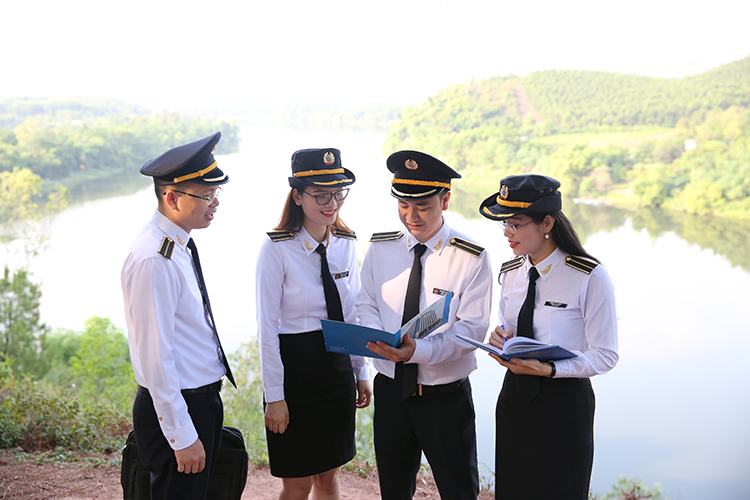Over the past time, along with other auditing contents and fields, the results of environmental audits have made an important contribution to that of the State Audit Office of Viet Nam (SAV). Considering that the SAV is to increase the number of environmental audits and improve auditing quality, it is necessary that functional audit units and auditors constantly strive to innovate methods of organizing audits to better meet the requirements.

The SAV has been continuously improving its capacity of environmental audit. (Source: the SAV)
Closely complying with the orientation in building audit content
Compared with other Supreme Audit Institutions (SAIs) around the world, the SAV is considered not to have much experience in environmental audit. Although this is a new audit field being implemented in recent years, environmental auditing has been an important matter of policies, laws as well as implementation practices.
Through audit activities, the SAV has reviewed and evaluated the effectiveness and efficiency of policies and regulations promulgated by the Government in order to achieve environmental protection objectives. Since then, the SAV has pointed out inadequacies and limitations in the implementation process, as well as made audit recommendations to the National Assembly and the Government to adjust regulations and policies in a timely and effective manner. In particular, the selection of content recently made by the SAV is considered to be in line with the higher orientations of the Party and the State, public concern, as well as with the resource conditions of the SAV.
Particularly, the Regional State Audit Office No. I has reported that on the basis of closely following the audit orientation, the environmental audits proposed and performed by this Office had covered various scopes and objects related to the environment, particularly the audit on the management and use of environmental public-service funds and investment in the construction of waste and wastewater treatment plants earlier this year. However, the audits have not yet met the public expectation and practical requirements; audit contents have not been explored in depth. While in the real life, there are still many environmental problems, which increasingly affect negatively on community and social interests such as water pollution; air pollution; pollution from hazardous wastes; pollution from the influence of socio-economic development,... which have not been clearly and emphatically stated in audit practice.
Having this fact in mind, and closely following the higher orientations of the Party and the State, and the direction of the leaders of the SAV, it is believed that environmental audits need to delve into the audit contents of the environment having or expected to have great influences on people’s lives and society, etc. Specialized State Audit Department No. III sharing from it's own experience that when selecting topics and developing annual environmental audit plans, it is necessary to study new topics bringing added values in the future such as auditing the implementation of sustainable development goals. In this regard, coordination on audit content among audit departments is required, or even among SAIs. An example is the audit of water resource management in the Mekong River Basin recently carried out at regional level by the SAV in cooperation with SAI Thailand and SAI Myanmar.
Implementing numerous solutions to improve audit capability
In the context of increasing requirements and expectations from the Party and the State on the SAV, the renovation and improvement of audit capability to enhance the audit quality and efficiency is an urgent requirement, including environmental audits.
It is noted that the environmental audit performed at the SAV are mainly integrated in the financial and compliance audits, just only few of them are performance audits or conducted independently, leading to the fact that the audit results were not as expected. Several audit departments have suggested that the direction of developing the audit plan 2023 and the medium plan 2023-2025 should be changed by increasing the number of performance audits relating to audit contents and topics.
Specific to this issue, the representative of the Environmental Audit Division (from Specialized State Audit Department No. III) has mentioned that with the available resources, the SAV is able to increase the performance audit in assessing the economy, efficiency and effectiveness of programs and activities related to sustainable development goals. This will also put auditors into certain challenges since environmental audit is new under such a difficult field of performance audit. However, “we are not going to skip because of its difficulty. Enhancing performance audit is the way for SAV to comprehensively assess the management and the usage of resources, and management responsibilities in environmental protection.” – said that representative.
In the context that building and strengthening the capacity of environmental audit is the focus area of the SAV, there are suggestions on the needs for specialized training for environmental auditors; inviting foreign experts to share experiences; sending auditors to attend courses abroad, seeking sponsored projects for the development of environmental audit, etc. With the peculiar characteristic of combining different types of audits within an environmental audit in which performance audit plays a vital role, it requires auditors to have relatively comprehensive auditing knowledge and skills, particularly the skills on criteria development, assessment of audit risk and materiality.
From a research perspective, capturing the experience of environmental audit from other SAIs, Associate Professor, Ph.D Mr. Nguyen Huu Anh (Institute of Accounting and Auditing) has mentioned that the SAV should continue to develop guidelines and methods of environmental auditing in line with the International Standards of Supreme Audit Institutions – ISSAIs). Specifically, the SAV should focus on innovating the risk-based audit approach, determining materiality using Automated Tools and Techniques (ATT), considering it as an effective supporting tool to collect sufficient appropriate evidence; promoting the use of experts, field work audits, application of geographic information systems in environmental auditing, etc.